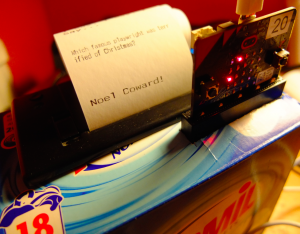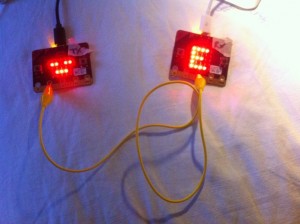 Here’s a big list of all my resources and projects for the BBC micro:bit which you may find useful, educational – and indeed fun.
Here’s a big list of all my resources and projects for the BBC micro:bit which you may find useful, educational – and indeed fun.
They’re a mixture of MakeCode and Python, some are simple, some are complex but all teach you something about how software and hardware interact. I’m especially proud of the thermal printer, full binary adder, 4×4 keypad and full PS/2 keyboard projects, but you can also attach OLED displays, 7-segment LEDs, and even get composite video out of your micro:bit with just two resistors and a breakout board!
- Noughts and crosses
- Send the time from a watch to a BBC micro:bit
- Use a micro:bit as remote Bluetooth temperature sensor
- Graphing micro:bit sensor data on a Raspberry Pi
- Turn Python code into emojis
- Make your own numbers station
- micro:bit Wordle
- Simple micro:bit video out
- micro:bit pulse oximeter
- Air quality sensor
- Super-simple machine learning
- Simple OLED driver
- Composite video via IchigonQuest
- micro:bit NIM
- smolBASIC
- Run BASIC on a micro:bit over serial
- Drive a multi-digit LED display
- OLED compass
- Radio messenger with PS/2 keyboard and OLED display
- Simple way to read a PS/2 keyboard on a micro:bit
- Computing fundamentals with the micro:bit
- Mastermind game with 4×4 keypad
- 4×4 keypad radio communicator
- Calculator with 4×4 keypad
- Learn how a keypad matrix works
- Improved mock CPU
- Make your own learning CPU
- Binary full adder
- Ultrasonic distance sensor theremin
- Play Arduboy games on a micro:bit
- Simple OLED micro:bit game
- Add an OLED display to your micro:bit
- Waveshare colour LCD display for micro:bit
- Black Mirror-inspired Cheese Nibbler game
- Connect a DS18B20 temperature sensor to a micro:bit
- KettleRun game for scroll:bit
- Surreal story printer
- Add a cheap 16×2 LCD display to a micro:bit
- Binary number system quiz
- Teaching physical logic gates with micro:bit
- Three micro:bit music experiments. (MakeCode)
- Connect a thermal till roll printer to your micro:bit
- Class voting system – up to 25 people can vote ‘yes’ or ‘no’, answers tallied on a micro:bit’s display
- Radio treasure hunt – find the hidden beacons
- Pandemic flu game / science experiment
- Making pocket calculators with micro:bits
- Live plotting readings from micro:bit’s internal sensors
- Live plotting readings from the Monk Makes Sensor Board
- Teleporting ducks and chuck-a-duck
- Long scrolling displays with several micro:bits
- Micro:bit-controlled radio or MP3 player
- Wireless data logging with hard copy printout
- Wireless 2-player Pong
- Lesson introducing wireless data on the microbit
- Simple wireless microbit Morse code transmitter
- Simple Python Tilty game with sound.
- Kettle Run – Can you do the Kettle Run in less than 12 parsecs? Pilot your craft through canyons of doom to be rewarded with… a lovely cup of tea! A more sophisticated, extendable Python game with sound – plus a hex file you can drag and drop if you don’t want to look at the Python code.
- A possible first Python lesson. I will be trying this out next week!
- Make some noise by attaching noise-making things.
- Is your plant happy? Get physical with the micro:bit, a bit of Python, some nails and a resistor.
- Send and receive secret Morse code messages between two micro:bits using just a couple of bits of wire. Simple way to teach networking, protocols – as well as variables, conditional branching, infinite loops and binary control of GPIO pins.

- Use the micro:bit as a wireless remote data logger.
- Make a weird musical instrument using an old mixing desk fader.
- Experiment with an old scrap volume control / potentiometer.

Hi Giles,
I’ve been enjoying following on twitter the progress of your micro:bit Crossy Road game using an OLED display and wondered if you’d like a free zbit:builder board to mount the display on? See examples on
http://www.zbit-connect.co.uk/zbitbuilder.html
Note that with zbit:builder you can still plug in other micro:bit accessories as it replicates the micro:bit connector at the bottom and all GPIO signals are still available with the unique zbit:connector.
Anyway, if you’d like one for this project, or use it on another project, drop me an email and I’ll send you one.
All the best,
Mr Zbit
Apologies for the delay in approving your comment – I get a huge number of spam comments and they tend to swamp the real ones. A very kind offer, I need to finish this on a breadboard first and then decide the next step! best wishes, Giles